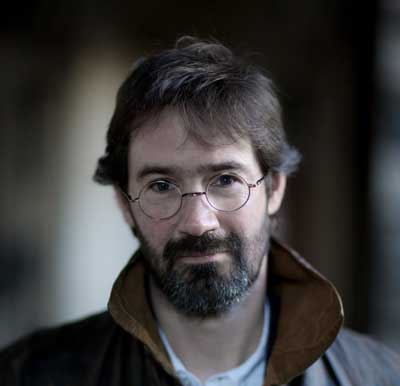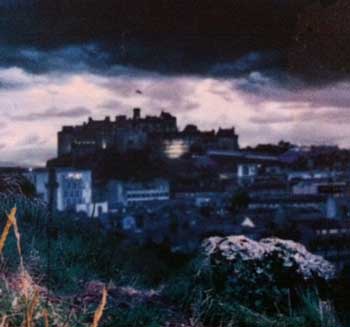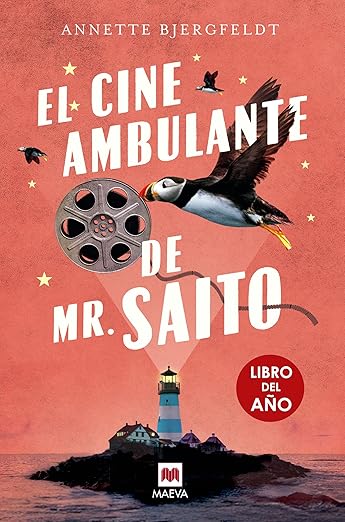James Oswald talks Edinburgh
Chewing the cud with James Oswald on the booktrail today. Author of supernatural crime novels set in Edinburgh. You can visit the locations in James’ novels here

Thank you first of all for your kind interest in wanting to do this interview and for taking the time to answer the questions with such interesting answers. I have hungrily read both of your books and promptly jumped on a train in order to do the book trail! I thought I knew Edinburgh well having lived there as a student but, oh no, I hadn’t experienced it through the eyes of Inspector McLean!!
You lived in Edinburgh as a student. You capture the spirit of Edinburgh very well. How did you go about getting this detail right?
What not a lot of people know is that I wrote the first two books, Natural Causes and The Book of Souls, whilst living in mid-Wales. I bought myself OS Landranger maps of the city and surrounding area to make sure I got the names right, but the rest was just dredging up memories. I studied for an MSc in Artificial Intelligence at Edinburgh University in the early nineties (alas, a course I never completed, lacking sufficient natural intelligence.) I also spent five years living in Roslin to the south of the city, commuting in by bike. I’ve known the city a long time, though even I get things wrong from time to time.
Do you think Edinburgh lends itself well to gothic, supernatural murders? How important were the settings in your book to reinforce the dark content?

Edinburgh is a very old city, with many layers to it both geographically and socially. It also has a long and bloody history and countless tales of ghosts, ghouls and foul goings on. It’s the city of Burke and Hare and Mary King’s Close, the Black Museum at the Surgeon’s Hall and countless horrifying tales. Ghost walks around the Old Town are enormously popular, and walking those dark narrow streets, shadowed by tall tenements, it’s not hard to see why. The settings I use for the books undeniably help to build the atmosphere, and the joy of using the city is that a lot of my work is already done for me.
What was your experience of E-Publishing and how do you feel to be a published author now with Penguin?
E-publishing was very easy to do, especially given my background in website development. An e-book is basically a specially formatted web page, so making my books look good on an e-reader wasn’t hard. Making sure the words were all spelled correctly, the punctuation was right and there were no continuity errors was not so easy, and that is where a lot of self-published authors fall down. Proof reading your own work is nigh-on impossible. Designing a cover that is both arresting enough to grab someone’s attention in a fraction of a second and easy enough to be read even in small thumbnail size is another skill most authors don’t have. I paid for professional cover design – not as expensive as you might think – and had several friends read the books for typos before I put them out there. Even so, the finished result wasn’t perfect.

Working with Penguin has been a joy. I always wanted to be a writer, not a publisher, and having professional editors go over my manuscripts has improved them immeasurably.
Holding a print edition of my first book in my hands was undeniably a high point in my life, but the best moment was a couple of months later when I got onto a train in London, heading back to Edinburgh, and sat down opposite a woman who was reading Natural Causes. And yes, I did introduce myself! (Book trail note: Quite right! I would have loved to have been there to see their face!)
Any advice to give an aspiring writer?
Finish the book. So many people I know have started writing a novel and then given up after a few thousand words. People often go back and endlessly rewrite what they’ve done so far. Don’t. Leave it alone. It’s far more important to get the whole, finished story down. It will be rubbish, but it will be a starting point for the other key job of an author – that of a rewriter.
Having said which, I would add that you should never take any piece of writing advice as gospel. It’s just advice. Weigh it up, try it for yourself if you think it might help, but don’t struggle with it if it doesn’t fit the kind of writer you are.
Are any of your characters based on people you know or have known? McLean especially interests me. Oh and I love the name Grumpy Bob.
Grumpy Bob’s name comes from the nickname of an acquaintance of many years ago. I don’t think he knew that was what everyone called him. I love the way the sound of it rolls off the tongue. Grumpy Bob is, of course, notable for his lack of grumpiness, and apart from the name is entirely made up.
There are so many good and interesting answers to my questions that I just had to savour them and share them in two parts. Come back tomorrow for some more insights into McLean’s Edinburgh. In the words of the man himself!
Booktrail Boarding Pass Information:
Twitter: @SirBenfro
Facebook: /jamesdoswald
Web: jamesoswald.co.uk




